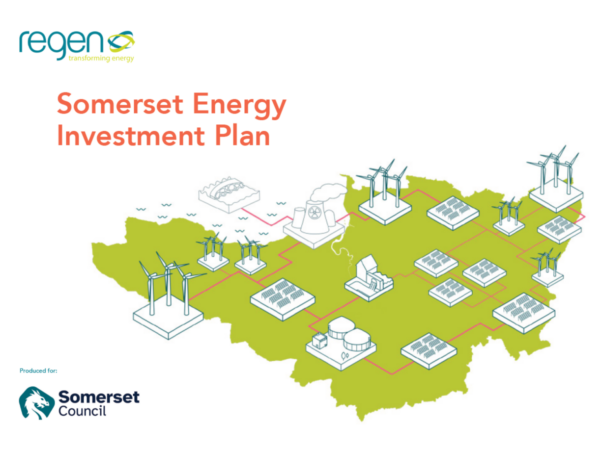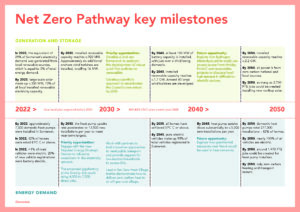Last year, Regen was approached by Somerset Council to produce an energy investment plan and roadmap to net zero. Here, Tamsyn Lonsdale-Smith outlines the aims of the project, some of the challenges it faced and some key recommendations.

In May last year, Regen was commissioned by Somerset Council to develop a county-wide energy plan that would forge a roadmap to achieving its Climate Emergency Strategy objectives. These are to decarbonise local authority and wider public estates, work towards making Somerset a carbon-neutral county by 2030 and create a county that is prepared for, and resilient to, the impacts of climate change.

The aim was to set out how the council might work with community energy organisations, the private sector and other stakeholders to invest and grow renewable energy in Somerset. The project also included an economic benefits assessment to identify investment projects and establish an evidence base for future partnerships and funding opportunities.
However, when the council learned it would be facing budgetary cuts, we had to respond and reshape our key recommendations in a way that was mindful of resource constraints that placed the council in the role of key facilitator, rather than lead investor. So, how can a council that’s strapped for cash still come forward as a leader in the local net zero energy transition? One thing is certain – strategic partnerships, strong local planning and priming the market will be the key levers to unlocking some of the most exciting opportunities.
Our recommendations were organised under six key themes:
- Decarbonisation of the council’s own estate and operations
- Large-scale solar wind and battery storage development
- Unlocking energy efficiency and retrofit
- Electrifying heat demand
- Electrification and demand reduction for transport
- The energy system
Each of these contains opportunities around priming the market, local planning and strategic partnerships. Our hope is for this report to be a guidebook and first port of call for the council to refer to when planning the net zero transition. To ensure it doesn’t sit unopened on the shelf, we set up an internal steering group and task and finish group to engage, obtain buy-in and test solutions to garner support for the project as a whole. Each theme was carefully considered using criteria such as: Will it provide a significant opportunity to deliver net zero? Does it present immediate opportunities for Somerset in terms of investment or jobs?
A few of the recommendations in particular stood out to me as having high potential impact:
Positive local planning policy to transform delivery in appropriate locations: The new Local Plan could include robust planning policy to support the development of high-quality large-scale solar, wind and energy storage projects that maximise local benefits, subject to other considerations such as social, environmental and economic factors.
In fact, the policy impact of implementing some of our recommendations into the new Local Plan is so large that it spans across several of our key recommendations. We recommend that the Local Plan should:
- Allocate suitable areas for wind development, in line with requirements by the National Planning Policy Framework
- Set retrofit targets to support retrofit and deliver zero-carbon homes
- Set renewable targets in line with the findings of the Somerset Energy Investment Plan
- Adopt ambitious local zero-carbon housing and non-domestic standards
- Restrict new gas connections
- Develop strict planning regulations for high carbon generation
Facilitating local hubs to develop local skills: The council should lead a skills transfer programme, in partnership with educational institutions, that uses facilities and workforces brought into Somerset by projects such as Hinkley and the gigafactory.
In terms of most job creation, there were some clear winners from the analysis. Installation of rooftop solar and retrofit jobs had the highest potential for creating the most FTE job years. These could be key sectors to target for skills transfer programmes, particularly for workers previously at Hinkley C. Regen has engaged heavily with EDF and Hinkley C stakeholders to highlight this unique opportunity to bridge the skills gap. In addition to this, several stakeholders from across education, skills and manufacturing sectors expressed interest in taking part in such a partnership.
Setting out a vision for land use and energy that delivers co-benefits for nature and the agricultural community: The council should consider how to support the coexistence of renewables and agriculture, reviewing best practice on existing schemes, working with the rural community and developing appropriate local planning policy and guidance.
A key aspect in building these recommendations was external stakeholder engagement. People across many different Somerset-based organisations with a stake in local energy development engaged with us over the course of the project either via webinars, interviews or email. This forms the backbone of future partnerships between the council and local industry, and our hope is that discussions raised, begun or continued during this engagement process will continue well after project completion.
An ongoing project between the council and UK100 will lean on the findings of this report to help the council find funding and support opportunities that this piece of work has identified.
